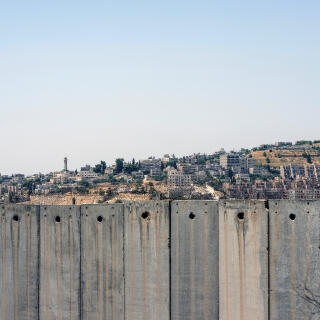As far back as he can remember, Hamza Erekat has always seen huge concrete blocks blocking his view of the horizon. The young Palestinian is 20 years old. He was born the year Israel began building what everyone here calls "the racist separation wall." The line crosses right through his yard, beneath the window of the room he shares with his three brothers, in Abu Dis, in the heart of the West Bank.
During the summer, he often dines on the roof with family and friends. From the rooftop, they can see beyond the concrete blocks with a very clear, very close view of Jerusalem, with the golden crown of the Dome of the Rock overlooking the old city right in front of them. "My father worked there, spent his daily life there. We never had the chance to see that life," Mr. Erekat said with a sigh, combing back his hair.
He visited the Holy City as a child, then again to have an operation. What used to take his father 10 minutes by car before the construction of the wall would later take him half a day each time: the grueling passage through the checkpoint, the bus, the waiting, etc. After a wave of knife attacks in 2015, the Israelis tightened the rules, and permits became even rarer.
A 700-kilometer wall
At the end of April, during Ramadan, Mr. Erekat climbed a ladder with some friends and managed to get to the other side. Accomplices had cut the barbed wire over the concrete fences. "It was crazy! There were hundreds of us. Before, I was afraid to go up. We were afraid we'd run into soldiers. We went to pray at the Aqsa Mosque." He smiled, then stepped down from the terrace. In the yard, the air that late morning was heavy: The wind no longer passes through, blocked by the concrete.
"It's impossible to measure everything we've lost. We've lost land, our employment area and our education and health centers, which were all in Jerusalem. And we've lost lives." Abdelsalam Ayad, mayor of Abu Dis
Israel decided to build the wall during the second Intifada, in 2001, in the midst of a wave of suicide bombings. The first blocks were put in place in 2002. Today, it is still not finished. Referred to euphemistically in Hebrew as a "security fence," the imposing military edifice stretches over 700 kilometers, 85% of which is located inside the occupied West Bank, nibbling away at Palestinian land and isolating agricultural land.
In the eyes of international law, this complex system – of concrete blocks, electric fences equipped with sensors, barbed wire, fencing and ditches, guard towers and cameras – is illegal. Israel claims to be defending itself against Palestinian attacks. But Palestinian geographer Khalil Tafakji explained, "The wall is not there for security reasons. It's a border-marking operation, decided on by only one party [Israel], in the West Bank. In Jerusalem, the wall was built to exclude Palestinian residents."
You have 63.89% of this article left to read. The rest is for subscribers only.
